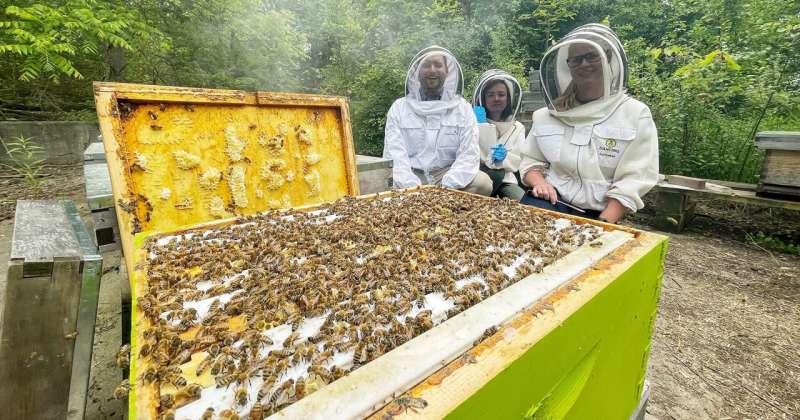This article has been reviewed according to Science X's editorial process and policies. Editors have highlighted the following attributes while ensuring the content's credibility:
fact-checked
peer-reviewed publication
trusted source
proofread
Probiotics positively influence honeybee health, study shows

Widespread pesticide-use and diminished floral diversity in the environment have contributed to the worsening susceptibility of honeybees to infectious disease, threatening their support of adequate pollination of food crops. With the aim of tackling honeybee decline, a collaborative team including researchers at Western University have shown certain probiotic bacteria can be used to help ward off disease and promote overall hive health.
In a new study published in The ISME Journal, scientists used two methods to deliver probiotics to hives within large commercial apiaries in California—a probiotic pollen patty and a spray-based delivery system—demonstrating a range of health benefits associated with the supplementation.
"We tend to think of bees just as organisms in themselves. But actually, bees have co-evolved with a lot of other organisms, the plants they feed on, and the bacteria that live inside their guts," said Graham Thompson, biology professor at Western who has been studying honeybees for over two decades. "Those bacteria are functionally very important to the bees, for digestion and acquiring nutrients. It's a symbiotic arrangement."
Testing in a real-world setting
While the Western team in collaboration with Lawson Health Research Institute has led research on three probiotic strains and shown they benefit honeybees, this latest research is the largest field study of its kind to date.
"Seeing an effect in the lab is one thing, but seeing it in the real world is quite another," said Thompson. "After treating the hives with probiotics using a BioPatty and a novel topical spray, we monitored them for all kinds of downstream effects and found lasting effects in their ability to withstand a variety of very common diseases."
The probiotics developed by the researchers at Western and Lawson are specifically designed to enhance the honeybee's core gut microbiota to boost their immunity and provide a viable alternative to antibiotics.
"Right now, most beekeepers treat their hives with antibiotics to prevent infectious disease," said Brendan Daisley, a former Ph.D. student at Western and now a postdoctoral researcher at Western and the University of Guelph.
"Unfortunately, there are a lot of negative side effects associated with treating hives with antibiotics, including development of resistance, and off-target health effects due to the drugs harming beneficial microbes, in addition to the pathogens of interest. We need different solutions to improve honeybee health, especially in a sustainable way, and we believe probiotics could be a feasible option."
The researchers say part of the goal of testing the delivery methods of the probiotics is ensuring the research can be easily translated to the real world.
"A beekeeper has to go to the hive and be able to apply the probiotics, so we're trying to make it easier for them to do that," said Gregor Reid, professor emeritus at the Schulich School of Medicine & Dentistry, retired Lawson scientist and an international expert on probiotics. "We aim to make the solution practical, easy to use and proven to work, which is the essence of translational science. Not every bacterial strain works and even some commercial products have not been proven to be effective, so we can't generalize. The key is selecting the right strains and proving they are effective in the real world."
The team is working closely with SeedLabs to promote their research with major players in the beekeeping world.
Bee research on campus
The next phase of this research is continuing this summer on Western's campus in the university's experimental apiaries. Students Anna Chernyshova and Sophie Killam will be looking at how the probiotics influence the bees' social behavior, to understand what is referenced as the "gut-brain-axis." In other words, how probiotic bacteria influence the brain.
"The idea is fascinating because it shows that the gut and the brain are actually communicating with each other through millions of bacteria releasing or inducing specific chemicals and neuro-compounds that influence the activity of the brain, including behavior such as grooming or cleaning," said Chernyshova, a Ph.D. student in Biology. "Previously, this has only been studied at the individual level. And as we know, honeybees are social. So, we are looking to see if and how probiotic organisms can improve foraging and hygienic behavior."
The researchers are also comparing the hives treated with probiotics to those that have been treated with antibiotics to see which performs better. Using pollen traps, they can assess overall pollen production and determine which hives have bees that go to more diverse flowers.
Killam, a master's student in Thompson's lab, is looking specifically at how these manipulations of the bees' gut microbiomes influence where worker bees detect and remove diseased brood from the hive. She'll spend the summer alongside the bees using video, radio tags and other observations to monitor the insects' behavior.
"I've really enjoyed taking care of the colonies here and am excited to do the field work this summer," said Killam. "Bees are both an economically and ecologically important insect, for plants, animals and humans. And because they live in these large and close-knit colonies close to humans and industry, they are susceptible to disease. Looking at how we can support their health and well-being through natural mechanisms is really important."
More information: Brendan A. Daisley et al, Delivery mechanism can enhance probiotic activity against honey bee pathogens, The ISME Journal (2023). DOI: 10.1038/s41396-023-01422-z
Journal information: ISME Journal
Provided by University of Western Ontario


















